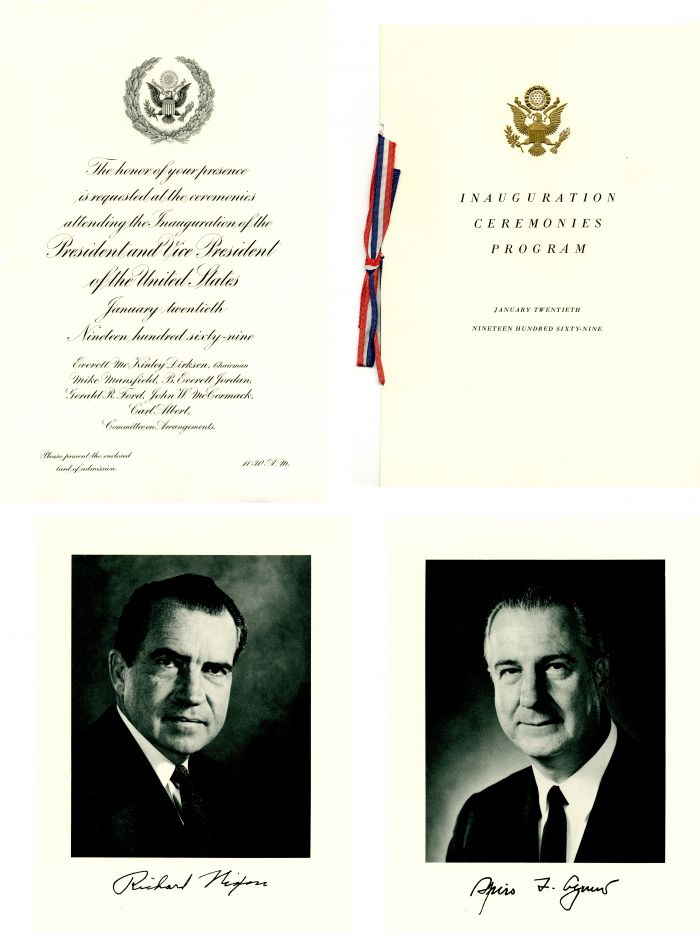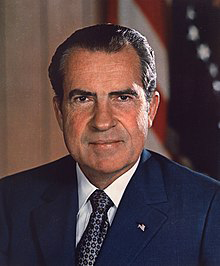Presidential Inauguration Group - Americana
Inv# AM1852
Group includes invitation, portraits of Nixon and Agnew and program for the President and Vice President inauguration of 1969.

Richard Milhous Nixon (January 9, 1913 – April 22, 1994) was the 37th president of the United States, serving from 1969 to 1974. A member of the Republican Party, Nixon previously served as the 36th vice president from 1953 to 1961, having risen to national prominence as a representative and senator from California. After five years in the White House that saw the conclusion to the U.S. involvement in the Vietnam War, détente with the Soviet Union and China, and the establishment of the Environmental Protection Agency, he became the only president to resign from the office, following the Watergate scandal.
Nixon was born into a poor family of Quakers in a small town in Southern California. He graduated from Duke University School of Law in 1937 and returned to California to practice law. He and his wife Pat moved to Washington in 1942 to work for the federal government. He served on active duty in the Naval Reserves during World War II. He was elected to the House of Representatives in 1946. His pursuit of the Hiss Case established his reputation as a leading anti-Communist which elevated him to national prominence. In 1950, he was elected to the Senate. He was the running mate of Dwight D. Eisenhower, the Republican Party's presidential nominee in the 1952 election, subsequently serving for eight years as the vice president. He unsuccessfully ran for president in 1960, narrowly losing to John F. Kennedy. Nixon then lost a race for governor of California to Pat Brown in 1962. In 1968, he ran for the presidency again and was elected, defeating Hubert Humphrey and George Wallace in a close election.
Nixon ended American involvement in Vietnam in 1973, ending the military draft that same year. Nixon's visit to China in 1972 eventually led to diplomatic relations between the two nations, and he gained the Anti-Ballistic Missile Treaty with the Soviet Union the same year. His administration generally transferred power from federal control to state control. He imposed wage and price controls for 90 days, enforced desegregation of Southern schools, established the Environmental Protection Agency, and began the War on Cancer. He also presided over the Apollo 11 Moon landing, which signaled the end of the Space Race. He was re-elected in one of the largest electoral landslides in American history in 1972 when he defeated George McGovern.
In his second term, Nixon ordered an airlift to resupply Israeli losses in the Yom Kippur War, a war which led to the oil crisis at home. By late 1973, Watergate escalated, costing Nixon much of his political support. On August 9, 1974, facing almost certain impeachment and removal from office, he became the first American president to resign. Afterwards, he was issued a pardon by his successor, Gerald Ford. In 20 years of retirement, Nixon wrote his memoirs and nine other books and undertook many foreign trips, rehabilitating his image into that of an elder statesman and leading expert on foreign affairs. He suffered a debilitating stroke on April 18, 1994, and died four days later at age 81. Surveys of historians and political scientists have ranked Nixon as a below-average president. However, evaluations of him have proven complex, with his successes as president contrasted against the circumstances of his departure from office.

Spiro Theodore Agnew (/ˈspɪroʊ ˈæɡnjuː/; November 9, 1918 – September 17, 1996) was the 39th vice president of the United States, serving from 1969 until his resignation in 1973. He is the second and most recent vice president to resign the position, the other being John C. Calhoun in 1832. Unlike Calhoun, Agnew resigned as a result of a scandal.
Agnew was born in Baltimore to an American-born mother and a Greek immigrant father. He attended Johns Hopkins University, and graduated from the University of Baltimore School of Law. He worked as an aide to U.S. Representative James Devereux before he was appointed to the Baltimore County Board of Zoning Appeals in 1957. In 1962, he was elected Baltimore County Executive. In 1966, Agnew was elected Governor of Maryland, defeating his Democratic opponent George P. Mahoney and independent candidate Hyman A. Pressman.
At the 1968 Republican National Convention, Richard Nixon asked Agnew to place his name in nomination, and named him as running mate. Agnew's centrist reputation interested Nixon; the law and order stance he had taken in the wake of civil unrest that year appealed to aides such as Pat Buchanan. Agnew made a number of gaffes during the campaign, but his rhetoric pleased many Republicans, and he may have made the difference in several key states. Nixon and Agnew defeated the Democratic ticket of incumbent Vice President Hubert Humphrey and his running mate, Senator Edmund Muskie. As vice president, Agnew was often called upon to attack the administration's enemies. In the years of his vice presidency, Agnew moved to the right, appealing to conservatives who were suspicious of moderate stances taken by Nixon. In the presidential election of 1972, Nixon and Agnew were re-elected for a second term, defeating Senator George McGovern and his running mate Sargent Shriver.
In 1973, Agnew was investigated by the United States Attorney for the District of Maryland on suspicion of criminal conspiracy, bribery, extortion and tax fraud. Agnew took kickbacks from contractors during his time as Baltimore County Executive and Governor of Maryland. The payments had continued into his time as vice president; they had nothing to do with the Watergate scandal, in which he was not implicated. After months of maintaining his innocence, Agnew pleaded no contest to a single felony charge of tax evasion and resigned from office. Nixon replaced him with House Republican leader Gerald Ford. Agnew spent the remainder of his life quietly, rarely making public appearances. He wrote a novel and a memoir; both defended his actions.











Ebay ID: labarre_galleries